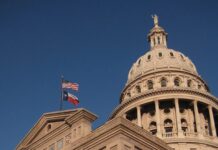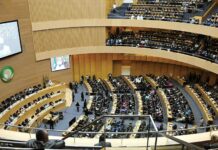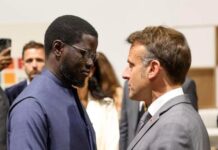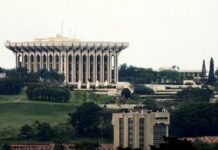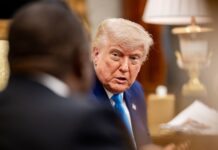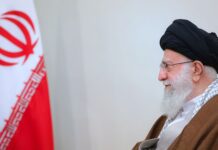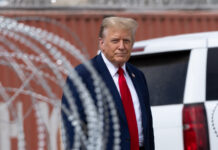Although we are still in the first few months of Donald Trump’s second non-consecutive term, there have already been a series of events that have altered the way in which the presidency in the United States is supposed to operate. This Trump administration has sought to stretch the powers of the executive branch to its very limits (many may even argue past its limits) in order to ensure that their agenda is implemented. So much of the power that lies in the presidency has now come under major legal scrutiny due to the excesses of the Trump administration.
Currently, as I am writing this piece, Donald Trump has taken the unilateral decision to nationalise the Washington DC police force away from control of the Mayor’s office of the U.S. capitol. Trump’s takeover of the national guard, he says, is in order to fight against violent crime in Washington, DC. In a major show of force, the US President has ordered the members of the National Guard to be stationed in the US Capitol to aid in the fight against crime. Which has resulted in the sight of massive military vehicles along with soldiers in military fatigues stationed across Washington.
Donald Trump has stated that he now wishes to do the same in cities all across the United States, recently setting his sights on cities such as Baltimore and Chicago, notorious for being high-crime areas. While the US President has a level of authority he can enforce over the police in the US capitol, the presidency does not have the same kind of power over states. However, as we had seen in California earlier in the year, that hadn’t prevented Trump from deploying the national guard against the wishes of the California government to respond to protests in the state.
This is just one of many major actions Donald Trump has taken, using the powers of the executive branch in unconventional manners to effect his agenda. We have seen the Trump administration go after private US colleges and universities by withholding federal funding used for research from US universities. Under the guise of combatting anti-Semitism on campuses, the Trump administration has sought to undermine their status as private institutions. The Trump administration has even gone as far as to attempt to dictate what the curriculum of private universities should be.
This undermining of the private sector has not only been confined to universities, either. Intel has been among the recent targets of Donald Trump, as the US president would call on the CEO of Intel, Lip-Bu Tan, to resign from his position. A few days later, US Commerce Secretary, Howard Lutnick, would announce that the US government would officially take a 10% stake in Intel. This kind of corporatism would not normally be associated with capitalist countries, yet here is a Republican president ordering the government to take control over a major American industry.
Another way in which Donald Trump has sought to use his executive authority has been with his economic agenda. Donald Trump has used the executive branch to wage a trade war against the entire world, placing tariffs on every country the US does trade with. Trump set off the trade war with no input whatsoever from the US Congress. It has been Trump alone taking these actions that have had major impacts on business all across the US by himself. The result of Trump’s trade policy has been that America’s reputation all around the world is being severely damaged.
Trump would also take the highly controversial decision to enter the United States directly into the Israeli war against Iran in June, earlier this year. Despite the fact that there had been major reservations among Democrats and some Republicans (particularly among Trump’s own MAGA base) against the US getting directly involved. However, on the 22nd of June the US military, at the order of Donald Trump, would strike Iran’s nuclear facilities. Another instance in which the President would take unilateral action that had the ability to affect the lives of all US citizens without any input from the other branches of the US government.
In Donald Trump’s first 100 days of his second term, he would sign a staggering 143 executive orders, more than any other US president. Several of these executive orders have ignored or violated the US Constitution and undermine the authority of the US Congress to set laws. In this relatively short period of time, we have already seen massive overreach by the executive branch eroding the authority of the US Congress, relegating elected representatives to mere spectators on major issues such as trade, foreign policy, immigration and even US involvement in foreign wars.

These actions by the Trump administration are not just some power grab, but rather the fruits of an ideology that has begun to take hold, particularly among right wing circles in the United States, about the way in which the presidency is supposed to function. That being the unitary executive theory, which posits that the US President possesses all executive power, giving them sole control over the executive branch and all its employees, including the power to remove officials at will. That is the ideology behind all these unitary actions taken by the Trump administration.
When America’s founding fathers drafted the US Constitution, emphasis had been placed on the separation of powers between the executive, legislative and judiciary branches of government. These three branches are meant to be equal to one another; however, we have seen the Trump administration largely disregard Congress on major issues and even ignore some rulings by US courts. There has been a constant chorus of far-right influencers calling on the Trump administration to go even further and completely disregard court orders that go against its agenda.
This consolidation of power in the executive branch did not begin with the Trump administration. This trend was underway even under Obama’s presidency. After Democrats had lost total control over the House and Senate in the 2014 midterm elections. Obama would infamously state “I’ve got a pen, and I’ve got a phone,” underscoring that he was prepared to work around the US Congress in order to push his agenda forward. Likewise, in many instances, we have seen the US Congress defer much of its responsibilities towards the executive branch over the years.
However, in Trump’s second term, we have seen this trend of the consolidation of power in the executive branch accelerate drastically. It is not possible for anyone to look at the state of the US federal government and come to the conclusion that the principle of coequal branches of government is still a reality today. The power of the US federal government is extremely lopsided in favour of the executive branch. That has been the major reason for the high levels of polarization that exist around US presidential elections, due to the massive amount of power that the office holds.
What proponents of the unitary executive theory may not realise is that the future that they envision for the United States already exists in many countries around the world. In fact, there are many countries around the world that exemplify the unitary executive theory perfectly. The only caveat being that those countries where so much power is placed in the executive branch are rarely democracies. You would find that in many of the most corrupt and most dictatorial regimes around the world, all executive power is usually placed in the office of the President.
We already have multiple examples of such systems existing around the world where the executive branch has the ability to operate without any kinds of checks and balances in place limiting its authority, particularly in many third-world countries. In our countries, the unitary executive theory is not so much a theory, but rather the reality of the way in which the governments of most of our countries operate.
If you were to have a look at the different types of governmental systems that are most common across the African continent. There would be a very glaring pattern that you would undoubtedly notice, which is that nearly all African countries’ governmental systems are based on the presidential system. There is some nuance that exists: some African nations utilise the full presidential system, some have dual executives where the president exists alongside a prime minister. However, almost every single African country uses the presidential system in one way or another.
It is very telling that following independence, the presidential system received such widespread adoption in nearly all of our countries. The reasoning for that is not because of any kind of admiration for the governance structure laid out in the Constitution of the United States or anything of that sort. Rather, for African leaders, the presidential system, due to the massive amounts of power placed in the executive branch, has been the mechanism used by our rulers to entrench their positions of power over our nations.
In the presidential system, the president serves as both head of government and head of state, a position megalomaniac rulers are always eager to insert themselves into. Unlike in parliamentary systems, where a prime minister derives his power from the support of a majority of the legislature, a President is typically not subject to the legislature. Compounding that, the threshold established for the legislature to impeach a president is often too high to truly constitute any kind of real threat to the presidency, meaning the presidency is typically an extremely entrenched position.
This entrenched leadership is what has allowed for corruption and economic mismanagement to spread in the numerous undemocratic regimes across the continent. There is typically a total lack of any accountability mechanisms on the president in nearly all of our countries. Presidents typically have the military, the police, intelligence agencies, the judiciary, etc., all working at their behest rather than serving the people, which is what allows for corruption and democratic backsliding to take place. Our governments are the literal embodiments of the unitary executive theory.
America is, at the end of the day, a nation that has had a long history of democratic rule. And yet, even with the years of democratic governance coupled with the robust legal system that exists within the United States, Donald Trump has managed to push those checks and balances to their limit. Now imagine how much easier it is for our countries that do not have that history of democratic rule, nor do many of our countries have strong judiciary systems that can hold the government accountable for its actions.
In these sorts of systems, all it takes is for a president who is willing to completely consolidate all power. Whether it be by changing the country’s constitution to extend his rule, as we are seeing currently taking place in the Ivory Coast and the Central African Republic. Or by rigging the electoral system to hold on to power, as is common in numerous African elections. Or, as is the case in Guinea-Bissau currently, a president can just ignore the constitution entirely and choose to overstay his term without much pushback because he has already consolidated so much power.
The widespread adoption of the presidential system across the African continent will likely go down as the most detrimental decision made by African leaders in the aftermath of our countries gaining independence. Rather than seeking to build sustainable, well-structured governing bodies, African leaders instead sought to establish regimes where all of their country’s power would be concentrated in their hands. It just happened to be that the Presidential system would be the best tool that could be used by them due to the outsized amount of power placed in the presidency.
The truth is the presidency itself breeds corruption. The sheer concentration of power in a single office turns the contest for it into a ruthless struggle, where politicians will go to any length to secure the position. In that scramble, backroom deals, shady alliances, and compromises of principles become the norm, corrupting not just the political candidates themselves, but the entire political process. Making it rare for uncompromised figures to be able to rise to the heights of the presidency in such a system, meaning bad actors are the ones typically best poised to take advantage.
It is ultimately our nations that pay the price for these battles among elites over absolute authority. Politicians exploit religious, ethnic, and ideological divisions, turning citizens against one another in their quest for the presidency. This relentless polarization fuels a race to the bottom, leaving our societies fractured and torn apart. Rather than existing to serve the public, the presidency becomes a loaded gun that rival factions scramble to seize, not for the common good, but to aim at one another.
In African countries, this divide and conquer strategy has been even more effective due to our colonial past, which resulted in the drawing up of our nations’ borders without much care for tribal differences that may have existed between communities. Yet today, not dissimilar to the way in which colonial regimes had sought to divide us, our political establishments use similar tactics of demonisation and fearmongering of different ethnic groups in their pursuit of power. In the desperate rush toward the authority concentrated in the presidential palace, nothing is considered off limits.
If we want the African continent to progress, there needs to be a fundamental rethinking of the way in which our governments are supposed to function. In February this year, the admin of the White House’s social media team uploaded an AI generated image of Donald Trump wearing a crown caption “long live the king.” The irony is that this depiction of a king ruling over his people is not too dissimilar to the way in many African regimes operate. Our rulers are less like civil servants and more like imperial rulers looking down at us from their palaces.

Most African politicians do not see themselves as servants, rather they believe they are to be served due to their positions of authority. That is why they see no issue in using public funds to bankroll their extravagant lifestyles, while their constituencies live in poverty. Simply by virtue of their positions, they believe they have merited these lavish luxuries that come with their positions of power.
This is why even the simple act of criticizing an elected politician is often met with the harshest response. Our rulers demand respect, not because they have comported themselves in a manner worthy of respect, but rather because they believe their positions of authority alone entitle them to it. The irony, of course, is that the only respect they manage to command is rooted in the fear and coercion of their own populace. Beyond that climate of intimidation, African leaders are seldom respected.
We need to transition our systems of government to ones that function to serve its constituents rather than be served. And the best way in which we can do that is by abandoning the presidential system entirely. No more should we have rulers looking down at us from the heights of their presidential palaces. But rather, leaders that walk among us, who work to earn our trust and demonstrate their worthiness to serve their constituents.
We must transition away from these winner-takes all electoral systems that result in a single individual being handed massive amounts of power. Rather, our systems should be designed in a manner in which power is never concentrated in the hands of a few, but rather truly equal branches work to hold each other accountable. Systems where elected representatives are truly accountable to the public, who can be immediately dislodged from their positions once the populace feels they have failed in their obligation of serving their constituents.
The great thing is that we do not need to theorize about entirely new governmental systems to achieve such a reality. This type of system already exists in countries around the world. That is the proportional representation systems that exist in parliamentary governmental systems. The most democratic and most representative systems of government are the systems based around proportional representation. Proportional representation better reflects the will of the electorate, fosters genuine competition among political parties, better accountability and less corruption.
It is not enough to simply hope for a better president. Time and again, we endure gruelling election cycles marked by violence and polarization, all in the hope that one individual might wield the outsized power of the presidency for good. Yet, more often than not, we are left with the same entrenched leadership. And on the rare occasions when change does occur, the same patterns of corruption and power consolidation quickly re-emerge. We must come to terms with the reality that the problem lies not solely in the individual, but in the office itself.
Greed and a lust for power are part of our human nature. We can hope as much as we want for a sort of messianic figure to rise to power and make all of our lives better, but crafting government policy around such a figure existing is misguided. It is easy for politicians to give the impression of altruism, only to turn around and do the opposite once in power. That is why check and balances are so important when formulating government structures
If we are serious about building societies that are less corrupt, less divided, and truly democratic, then we must move beyond the presidency. Real democracy cannot thrive when so much power is concentrated in the hands of one individual. Instead, we need systems that disperse authority, that encourage accountability, and ensure that leaders serve rather than rule. Only then can we break free from the cycle of corruption and polarization that has defined our politics for too long.

